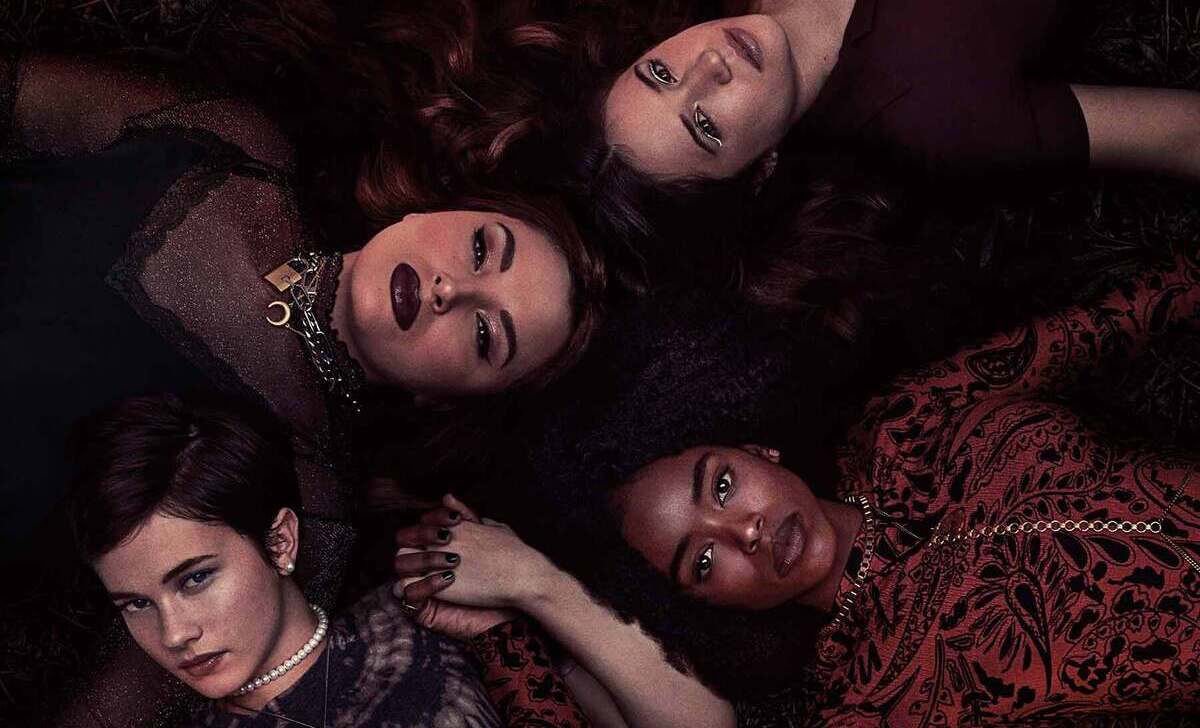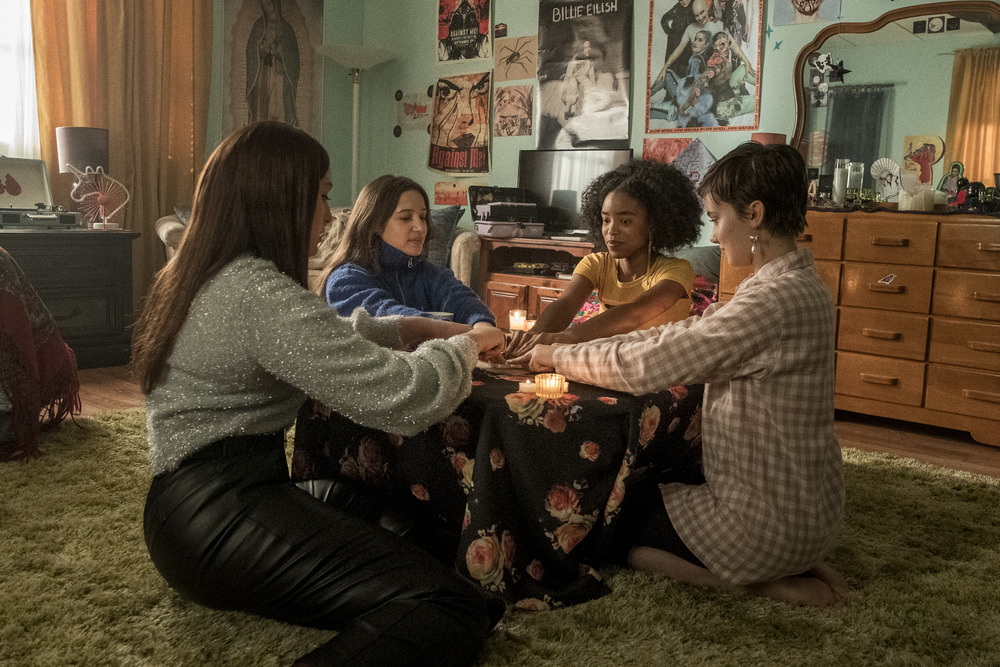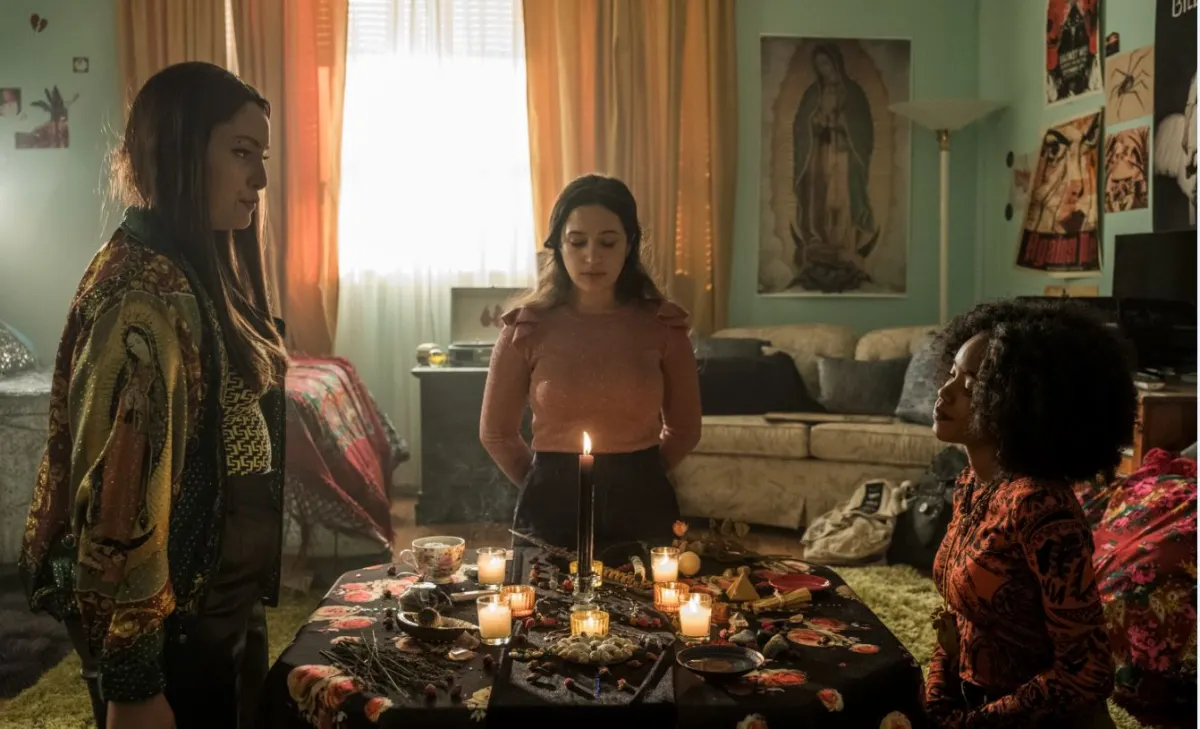So, you’ve watched The Craft: Legacy and loved it, or you’ve been browsing the #witchesofinstagram or maybe you heard about that whole hexing the moon thing. And now you’re ready to claim your truth and become a witch! But … how does one become a witch? Or if you are a witch, now what?
Well, enter three witches: the women behind the podcast, That Witch Life, which is all about living as a witch in today’s world. Now, I’ve been a practicing witch for a while, but there’s always more to learn, and this podcast is one of my absolute favorite sources for insightful discussions on everything from the fae and selecting a coven to goddesses and protection sigils.
Hosts Kanani Soleil, Courtney Weber, and Hilary Whitmore (all of them practiced witches and in Courtney’s case an author of multiple books) are here to answer the burning questions you might about becoming your most magickal self after viewing The Craft: Legacy.
The Mary Sure: First off, The Craft: Legacy seems to imply that the only way to be a witch is to be part of a coven? Is that true?
Kanani: Definitely not. Many witches start out and sometimes remain solitary. A lot of witches never join covens and just practice their craft on their own. My spiritual practice is incredibly personal to me and I love the freedom of a solitary practice. Solitary practice is perfect for witches like me who don’t like playing well with others. Covens are definitely not for everyone.
Courtney: There are benefits to working in Covens, for sure. It’s a way to affirm your experiences and learn additional skills. But Witchcraft is a practice and like music, you can play solo or with a band. I think the best Witches allow themselves to experience Covens and solo practice at different points of their life. I’ve been in Covens. I ran a Coven for a long time. Now I fly solo, with the exception of these two, whom I can’t get rid of, anyway.
Hilary: For some people, Covens are the right path but it is certainly not the only path to witchcraft. There are lots of resources out there for solitary practitioners who feel that a coven isn’t the right fit and I encourage them to dive in and find out what type of practices they are really drawn to and what feels right to them.
Say you do want to join a group: how do you go about that and what do you look for?
Kanani: Some people do want to be a part of a group and I think it’s important that they realize that a good coven helps them to grow and develop. No group is perfect and so you want to be sure that you are not putting a lot of stress on your expectations on others. It should be a place you go to learn and find community. A coven is not a place to seek fulfillment, that is an internal journey.
I would definitely look for any red flags you get, a coven should not ask you to do things that make you feel uncomfortable. If it isn’t a positive experience then you should definitely move on. There is a good chance you will have to experience a few different covens before you find one that fits your practice.
Courtney: It’s easier than ever to find a Coven or another Magickal group. Of course, given the Pandemic, gathering in-person isn’t advisable. But many Magickal groups are meeting on-line right now. A simple Facebook or Google search in a person’s area is bound to find quite a few options. There are also excellent Witchcraft schools out there such as Temple of Witchcraft or Sacred Mists Academy which provide wonderful guidance on starting your practice.
Look for groups that are well-organized and state their role and expectations upfront—for both themselves and their members. They should abide by a strict code of ethics for their time together and while most may ask for a modest fee to cover expenses (running a Coven isn’t cheap!), they shouldn’t be asking for exorbitant amounts of money.
Hilary: You should never feel obligated to do something that makes you uncomfortable and if you don’t feel comfortable with the first group you meet, that doesn’t mean there’s not one that is out there for you. A coven is a good place for learning and growing but I also like to remind people that it’s good to have external support as well. Witchcraft is amazing and powerful but it’s not always an easy journey, so outside support systems are always a good thing to have.

Is it accurate that every witch has an element? Have I unwittingly been ignoring my potential as a member of the water tribe or fire nation? If not, what was accurate about the role the elements play in magic?
Courtney: OMG I cannot with the labels. I had a Tarot client once come to me after she took a Facebook quiz that told her she was an “Air Witch” and wanted the Tarot to explain what that meant. Both I and the Tarot were like, ‘Huh?’ Elementals are a strong part of Magick and a great way to work with spells. I think it’s a waste of time to start clinging to labels in your Witchcraft.
Hilary: I find labels like this ridiculous. Most witches use multiple elements or focuses in their practice. Some are drawn to plants more than others, some love water magic, some prefer to work with the moon but there’s just no such thing as needing to pick just one element to work with. I personally work a lot with plants, candles, and stones but I also like to integrate other elements or properties into my magick as they seem fit.
Kanani: The elements are a part of all things so to limit yourself to only one seems counterproductive. We all have many sides and different life phases we go through. I definitely think that overall or at different stages, we feel more connected to one element over another. I have always loved and been drawn to water. It is a sacred place for me. But it doesn’t mean I don’t love setting things on fire or feeling the dirt between my toes. The elements are parts of a whole and while each can be individually powerful, when you use them together they are much more so. I am more than happy to be a Sea hag, pyro who loves to get dirty and feel the breeze through her hair.
This movie does a great job of making clear that magic and witchcraft are inclusive spaces. So, it’s correct that one doesn’t need a uterus or even to identify as a woman to be a witch?
Kanani: In general witchcraft is a very inclusive practice. That being said you can definitely find groups that are more femme centric and there are still some places that sadly exclude our nonbinary friends. The male and female aspect of witchcraft was a very old notion that came from what was more prevalent at the time. It’s much more of a grey area now, as it should be. Because we all have feminine and masculine energy in us.
Courtney: A uterus is not a prereq for Witchcraft. I repeat: A uterus is not a prereq for Witchcraft. In Ancient Greece, people with multiple genders or genders existing outside the male/female binary were honored as great practitioners of Magick. I know many, many Witches who are trans, non-binary, cis-male, or otherwise and they make incredible Magick. Cis-women have a history of being accused of Witchcraft, but they weren’t the only ones dealing with the accusations. It’s a grave misnomer that Witchcraft “belongs” to cis-women. I’m married to a cis-man Witch and he’s a badass.
Hilary: Witchcraft is for everyone and anyone who tells you otherwise is just plain wrong. There are all types of witches out there.
Do new witches (or even experienced ones) need to travel with a makeup kit filled with herbs, oils, and stones? That seems cumbersome.
Kanani: I mean you absolutely can. Have fun explaining that to the TSA. Some witches have items that they always like to have with them, but in general, I think people usually tend to charm items such as jewelry or other things they use daily to keep on them. As much as I would love a purse that holds everything, it hasn’t happened yet. Witches are just as practical as everyone else. We just usually smell better and have fun creepy stuff.
Courtney- Speaking of TSA, I love getting my bag searched when I’m carrying Tarot or my tiny cauldron. TSA men look scared. TSA women ask me for readings. I have never thought of the make-up case idea, but now I know what’s been missing from my Witchcraft. Bye.
Hilary: I tend to bring things that are specific to whatever I’m doing when I’m traveling. It’s definitely not necessary to bring every tool in your witches kit, though, and always make sure that the items you are bringing in, especially herbs or bones, are ok to travel with in the region you’re going to. Also, I’m mad at myself for never thinking of a makeup kit as a place to store my magickal tools.

So, about doing spells on other people? Is that cool?
Kanani: This is always a tricky question and to me the answer involves intent. If you are trying to stop someone from hurting themselves or others then I say yes. If you are wanting someone to get hit by a bus so that you get the job and they don’t then I say no. If you know someone who is ill and you are sending them healing energy and lighting a candle for them then absolutely.
Not all witches practice Wicca and so the threefold law isn’t something that really applies. For me, it’s about having a conscience and doing something you feel good about and confident in. If you can do the spell and still sleep at night while not being a sociopath, then you should be ok.
Courtney: Kanani’s mind always goes to hit-by-bus and that scares me.
Many Witches have personal prohibitions against practicing Magick on other people, but others do not. I have found that the spell is more successful if you cast it on someone with their consent, because their own intent strengthens the outcome. But I don’t hesitate to cast on someone else, especially if they’re causing me an issue and I need them to leave me alone. Still, it can be a wasted effort if you cast for someone based on what you think they need, versus what they want or actually need.
Hilary: Many witches have differing views on this topic I, personally, don’t have a problem doing spell work on other people in most instances. In fact, some spells help hold important boundaries. If someone won’t leave me alone, is talking untruthfully about me, etc a spell can be a way to protect myslef. It is also a beautiful way to help others with their own struggles. I find, as Courtney mentioned, the outcome is much more powerful if they are a willing participant.
Courtney: In one Coven I was involved with years ago, we cast a spell on a woman who was verbally violent and caused drama wherever she went. We thought if she were happy, she’d stop causing so many problems. At first, the spell worked. Without even knowing what we’d done, she remarked that “the world was suddenly being nice to her” and she felt “strangely happy for the first time.” But in truth, she didn’t want to be happy. After a brief bit, she went out of her way to start even more intense drama with others, leaving her (and everyone around her) even more miserable than before. As it turns out, some people really don’t want to be happy. If I were casting the spell now, I’d dust off a ‘Bitch Be Gone’ spell and send her off somewhere else.

What are some good resources for new witches just discovering the craft? (I’d personally recommend Gabriela Herstik’s Bewitching The Elements if you’re interested in the elemental side of things, and pretty much anything by Scott Cunningham – whose works are classics in Wicca for a reason.)
Kanani: I actually loved Drawing Down the Moon by Margot Adler because she shows the vast diversity that exists in the craft which I think helps people early on to understand that there is no right way to do witchcraft they need to be searching for.
Courtney: Anything by Ivo Dominguez, Jr. will offer clear, practical advice for working Magick. I also strongly recommend Outside the Charmed Circle by Misha Magdelene, for anyone interested in Witchcraft, but especially those looking for a Queer perspective on Magickal practice.
Hilary: I love Good Juju: Mojos, Rites & Practices for the Magical Soul by Najah Lightfoot and pretty much anything by Christopher Penczak …. Oh yeah and Courtney Weber is a pretty cool author too even though she paid me to say that.
And just to be clear, there’s no god called Manon? But are there are some deities associated with witches specifically?
Hilary: The only Manon I know is Manon Lescaut the opera by Puccini. I know, I know I’m an opera singing, classical music geek to the core and proud of it! As a god, though, Manon is definitely fake news. It’s also important to note that not all witches work with deities. If they do end up working with deities they may focus on just one or work with many. I often reach out to deities that are associated with the particular thing I’m trying to manifest.
Courtney: Yeah, no. Manon is not a real God. But hey, he’s probably getting honor and devotion from Witches around the world thanks to The Craft, and may exist now! Never underestimate the power of human belief. Gods exist because of eons of devotion.
Hekate, a goddess originating in ancient Mediterranean cultures, is considered to be a Goddess of Witches and Witchcraft. She was even summoned by the witches in Macbeth. Some of the Irish Gods are not specifically called Gods of Witchcraft in their mythology, but they are described as having powers of sorcery, such as the Morrigan Sisters who are shown as having power over the elements.
In truth, though, most Deities from Pagan or Neo-Pagan Traditions would be glad to show up to help out Witches. It ultimately depends on what the Witch is looking to do and what the Deity is best known for. If doing healing Magick, deities associated with medicine or healing would be good to invoke for those spells. If doing work for political purposes, deities associated with leadership are helpful.
Kanani: At different times I have found myself drawn to different goddesses who I felt spoke to me at the time. Bridgid was my first goddess that I worked with. It was helpful for me, in the beginning, to feel like I could focus my energies towards an individual goddess. These days my practice focuses more on energy and the magick in the universe. I have found myself starting to be drawn to the goddess Persephone and just created an altar for her. I can very much relate to a woman with an unhealthy codependence with her mother who is often in trouble for not listening and doing whatever she feels like.
—
You can check out The Craft: Legacy wherever you download movies and find That Witch Life on all major podcast platforms!
(image: Sony)
Want more stories like this? Become a subscriber and support the site!
—The Mary Sue has a strict comment policy that forbids, but is not limited to, personal insults toward anyone, hate speech, and trolling.—










Published: Oct 30, 2020 04:18 pm